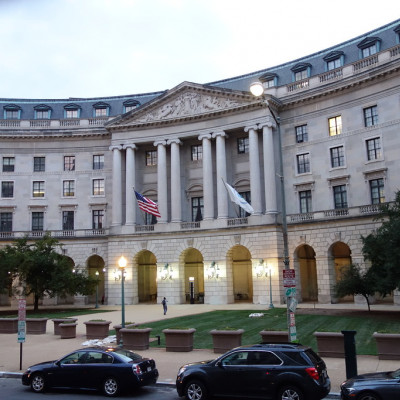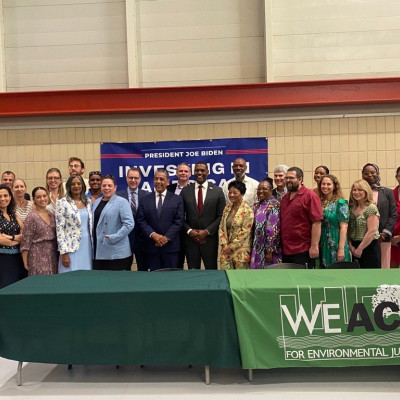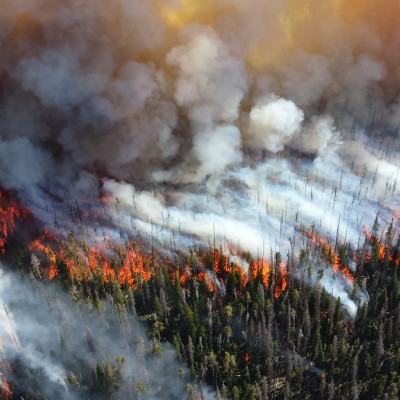April 30, 2023
April 2023 at Policy Integrity
- EPA Rolls Out New Rules for Transportation and Power Sectors
- Policy Integrity to Assist with New EPA Environmental Justice Program
- Long-overdue Updates Will Help Modernize Regulatory Review
- Webinar: Energy Insecurity & Energy Transitions — Obstacles & Opportunities
- Strengthening Agencies’ Consideration of Climate Impacts under NEPA
- We are Hiring!
- More From This Month
-

EPA Rolls Out New Rules for Transportation and Power Sectors
This month, the Environmental Protection Agency (EPA) proposed new standards for light- and medium-duty vehicles that will significantly reduce greenhouse gas emissions and other criteria pollutants from the transportation sector. Meredith Hankins explained why the rule would be robust against major questions doctrine challenges, emphasizing the Clean Air Act has always been “technology-forcing.” Hankins’ full statement is available here.
EPA also proposed to strengthen the landmark Mercury and Air Toxics Standards (MATS) which protect public health by limiting mercury and other toxic air pollution from coal- and oil-fired power plants. EPA based this strengthening on a revised technology review, which found that control technologies are more widely used, more effective, and cheaper than when EPA promulgated MATS.
EPA is also expected to soon release a proposal that will require coal- and gas-fired power plants to reduce their greenhouse gas emissions. The rule is expected to set at least some emissions limits based on the efficacy of new technologies that facilities can install to capture carbon. While the rule will face legal scrutiny, setting pollution limits based on controls installed at the source “is really the bread and butter of the Clean Air Act and the type of regulation that EPA has been issuing for decades,” Dena Adler told Politico.
-

Policy Integrity to Assist with New EPA Environmental Justice Program
The Environmental Protection Agency recently announced the launch of its Environmental Justice Thriving Communities Technical Assistance Centers, which will provide technical assistance, training, and related support to environmental justice communities. The Institute for Policy Integrity at NYU School of Law is part of a coalition led by WE ACT for Environmental Justice that was selected to establish one of the Centers for EPA’s Region 2, which includes New Jersey, New York, Puerto Rico, the U.S. Virgin Islands and eight Indian Nations. Policy Integrity will focus on assisting groups with a variety of legal, economic, and policy matters.
-

Long-overdue Updates Will Help Modernize Regulatory Review
The White House Office of Management and Budget recently proposed updates to Circular A-4, the primary guidance document on federal agencies’ economic analyses of regulations. Last revised in 2003, the guidance plays a key role in federal regulatory policy, shaping how agencies estimate the benefits and costs of rules. The proposed revisions update and expand OMB’s instructions to agencies regarding the consideration of benefits and costs that occur in the future or outside the United States; assessment of equity concerns related to the distribution of regulatory impacts; behavioral economics issues; and other matters. Natasha Brunstein and Max Sarinsky offer an in-depth analysis of the proposed changes in this blog post.
-

Webinar: Energy Insecurity & Energy Transitions — Obstacles & Opportunities
Join us for a discussion of energy insecurity and the energy transition on May 15th at 2 pm Eastern Time. Panelists will share takeaways from their research and policy work at the nexus of energy insecurity and energy transitions. Leading researchers and policy professionals will discuss how the energy security of low-income populations might be affected by different aspects of the energy transition and examine possible solutions. Register here! This webinar is part of an ongoing series highlighting energy equity research funded by the Alfred P. Sloan Foundation. Stay tuned for upcoming events!
-

Strengthening Agencies’ Consideration of Climate Impacts under NEPA
In January, the Council on Environmental Quality (CEQ) published interim guidance providing best practices to federal agencies for considering climate change in environmental reviews conducted under the National Environmental Policy Act. We submitted comments urging CEQ to (1) improve its recommendations on considering climate change vulnerability and resilience, and (2) refine its guidance to ensure that agencies do not inappropriately minimize greenhouse gas emissions of these actions. Max Sarinsky commended CEQ’s overall approach to accounting for greenhouse gas emissions: “I think the ways that CEQ suggests [to contextualize greenhouse gas emissions]—particularly, the social costs of greenhouse gases and considering carbon budgets and climate commitments—is really a thoughtful way to show what the emissions mean,” he told Inside Climate News.
-

We are Hiring!
We are looking for legal, economic, and operations staff to join our growing team! A full list of open positions and their job descriptions is available here, and includes Attorney, Senior Attorney, Legal Fellow, Economic Fellow, and Operations Associate roles.
-
More From This Month
- We submitted comments to the New York Public Service Commission on the state’s Energy Storage Roadmap.
- We published two new papers—one on the value of distribution system information for distributed energy resource deployment and another on the Federal Energy Regulatory Commission’s authority in light of West Virginia v. EPA.
